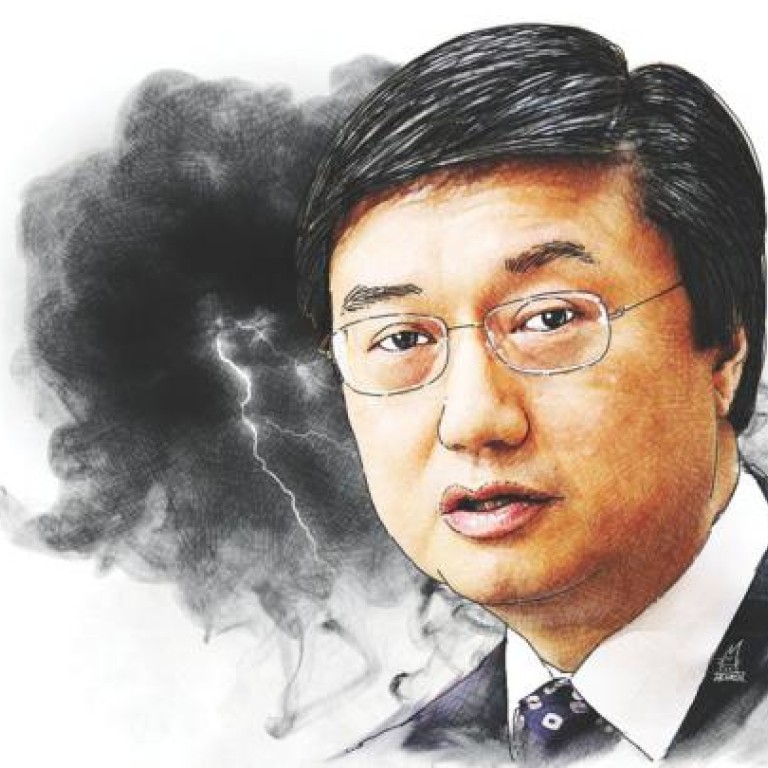
Naive Lam Fan-keung lost in the political woods
Property 'super-bull' proves with flat brouhaha that he is out of his depth when it comes to navigating the world of public perception
In his 20 years as a property analyst, Franklin Lam Fan-keung was known as a "super-bull" for his knack of producing spot-on assessments. But his judgment has been lacking recently in the china shop of politics.
Lam has taken leave of absence from his Executive Council duties a mere four months after he was appointed by Chief Executive Leung Chun-ying, amid suspicion he used insider information to boost his profits from the sale of two flats in Mid-Levels and offered an "extra commission" to a property agent.
Over the past couple of weeks, critics have suggested Lam has no place in Exco. Worse still, he has come under investigation by the Independent Commission Against Corruption.
Born in Hong Kong in 1961, Lam rarely talked about his background except that he had "two mothers" to feed. Mok Sau-hing, now 82, is his birth mother - and a veteran educator. Mok, who graduated from the University of Hong Kong in 1958, was a historian specialising in the Ming dynasty and the founding principal of the Buddhist Sin Tak College in Kwai Chung.
Her son finished secondary school in Hong Kong and went on to obtain his bachelors degree in economics at the University of Manchester. It was 1983, a year before prime ministers Zhao Ziyang and Margaret Thatcher of Britain met in Beijing and signed the Joint Declaration on Hong Kong's future.
Along with his peers, Lam witnessed the city's shift from being a window to the mainland to a worldwide hub for property and financial services, where he excelled to become the cream of the crop.
In the early 1990s, Lam, already a chartered accountant, joined the financial services industry. He worked as a research analyst in major fund houses and investment banks before joining UBS - where he made his name - in 1997.
He got his first taste of public service in the same year, serving part-time in the Central Policy Unit, the government's in-house think tank, during the Asian financial crisis.
Over the past decade, Lam appeared in the business pages of newspapers as a top investment analyst. A property super-bull, he reportedly held nearly 30 flats in his portfolio at a time and frequently cashed in from them.
"He made accurate projections of the property market and that earned him the reputation as one of the best analysts in the city. It is quite an honour in the circle," a fund manager said.
But loftier aims were in the offing. Last year he founded non-profit think tank HKGolden50 to advocate his theory of "golden five years": that a change to a pro-growth mindset was likely to define Hong Kong's future in the next 50 years.
His proposals included turning Tung Chung into a global hub for services that would boast a mega mall, eight hotels and a medical and office centre to deal with the demand generated by the influx of mainland visitors. He also supported further reclamation of the Victoria Harbour to boost land supply.
"We have fallen behind [Singapore], chiefly because we under-spend on hospitals, shopping malls, schools and housing, and our workforce and services," he said earlier this year.
Not long after, these proposals, together with Lam's expertise in property analysis, caught Leung's attention as the new government aimed to overhaul housing policy.
In July, Lam was appointed to Exco, among a new batch of members. He said the appointment would be his only full-time job and he would donate his monthly pay of HK$64,180 to charity to prove he was not in it for the money.
His rise came as a surprise to observers; even Lam himself admitted he was not particularly close to the new leader. "I am not a politician. I am not a C.Y. Leung supporter. The corporate I represent is a HK$2 company that's an NGO," he told the in July.
In the interview, he described himself as a factual guy who loved to talked about figures, but conceded he knew little about politics. "I have not even opened the first chapter," he said.
Lam's inexperience has been laid bare amid the furore over his flat sales, from which he made about HK$10 million profit.
Even as the government insisted he could not have known about the new stamp duties, Lam set himself a trap by giving contradictory claims: he initially talked about having offered an extra commission to his agent - which is illegal - supposedly to speed up the sale, but then said any excess proceeds were to go to a charity fund of the agency.
"There are no stupid, naive or innocent people out there [in property market]. They must know what they are doing," another fund manager said.
"The only reason Lam has screwed up is because of his overconfidence and a belief that he can get off the hook."
The savvy analyst that he is, had he read the book of politics, he should have known the trade is often not about facts and stats but about integrity, sensitivity and public perception.
For Lam, the pain of learning might have just begun.
Franklin Lam Fan-keung
Age: 51
Currently: Executive Councillor
Previously:
Founder, HKGolden50 (2011-)
Managing Director, UBS Global Asset Management (2006-2011)
Part-time member of Central Policy Unit (1997-1998)
Education:
Bachelor degree in economics, University of Manchester
Personal:
Married, two children
